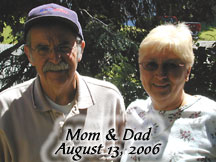Unfortunately I can't find any articles online to link to in reference, but last week in the New Haven Register, there was an article on a new study being offered at Yale University on Alzheimer's. (This is apparently the same vaccine, but several years ago.) My mother wanted me to call and see if my dad would be a candidate, so I did. The first step was just to leave my name and number. A few days later someone called back and asked a lot of questions. Of course, not the questions I had prepared the answers to, like which medicines does he take and how much of each. No, how tall is my dad? Umm. How much does he weigh? Umm. (I guessed, and my mom said I was pretty close.) For how many years has he taken multi-vitamins? What brand? umm. Then she asked "What does he do?" I kind of laughed. "He's got Alzhiemer's. He's retired." "No, what did he used to do?" Oh, that's easy-sell cars. And so on. I asked if he seemed good for that study and she said no, but he'd probably be able to get into a different AD study at Yale.
Friday my mom had a 1/2 day at work because of the corporate picnic, which she didn't want to go to, so when we did our usual Friday afternoon lunch, I went to the house to pick her up and my dad came along. She said that Yale had just called and accepted my dad into the vaccine study!
I explained the concept of a placebo to her--that depending on how the study is set up, at least 1/2 of the people get a placebo, which is a fake pill (or, in this case, a fake injection). Then some people may get a lesser dose of the medicine, and others the full dose. The study is double-blind which means neither the doctors or the patients know who is getting what.
Her response was, "well, Daddy's young and in good health so they'll give him the real vaccine."
Double blind. No one knows.
"Oh, they know."
I can I argue with such complacency?
And she thinks this could be a complete cure. Not so.
This drug removes the plaque from the brain. (According to the CNN article I linked to above, it does NOT remove the tangles.) It does not regenerate dead/lost cells. I can see that it would halt the disease in its tracks depending on how it really works (the disease, not the drug). If the tangles and plaque CAUSE the disease, the injections will be a great help. If they are only SYMPTOMS, it might not help much at all. Lost memories could not be regained, but we could hope that new memories could be made to replace them and no other memories would be lost. So what if my dad forgot someone's name? If he's re-introduced to that person, he'll remember her now. Not sure what would happen with things like math ability--could math be retaught the way a child learns, or is the capacity for doing math just gone? I don't know a lot about how the brain works (although I know a hell of a lot more than a did just over a year ago.)
And yeah, the 1 year anniversary of my dad's diagnosis just passed. So I did 43 entries in a year, or an average of one every 8 days. Not bad.
One of the best things about this study, in my opinion, is that he doesn't have to stop taking his existing medicines. I worried that he would get into a study, have to discontinue the medicines that were clearly helping him and slowing down the disease, and he'd get the placebo and lose everything we'd worked to keep, and gain nothing.
The bad thing about this study is that the previous study was halted because the vaccine gave people encephalitis. WebMD says this about encepahalitis:
Encephalitis is an inflammation of the brain that is usually the result of a viral infection. When the brain becomes inflamed—swollen and irritated—normal blood flow to the brain is altered,leading to symptoms such as confusion, fever, and severe headache.
Great. Just what my dad needs. More confusion. Apparently encephaltitis can also lead to death. My mom skipped over that part of the article obviously. I'd think that if they are offering it again they've fixed that part. I hope.
The final Verse
6 months ago










